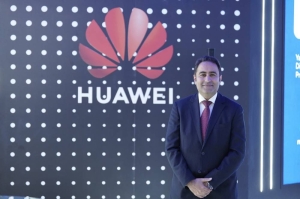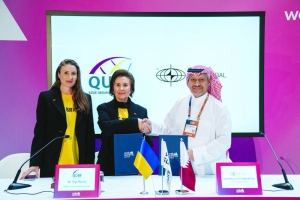The crucial role of Cybersecurity in shaping Qatar’s digital future

When I arrived at Hamad International Airport in early 2015, a prominent slogan greeted me: “Qatar deserves the Best.” This powerful message not only promised excellence but also painted a vision of Qatar’s ambitious drive toward becoming a global digital hub. As we approach 2030, this vision is rapidly becoming a reality, with Qatar not just meeting but setting new benchmarks in its journey toward a knowledge-based economy.
This transformation is evident in every aspect of Qatar’s development. The nation’s Digital Agenda 2030 is ambitious, focusing on harnessing cutting-edge technology, developing smart cities, and fostering a robust digital economy. The recent launch of the National Cyber Security Strategy (NCSS 2024-2030) reinforces this commitment, setting a clear direction for securing Qatar’s digital landscape as it moves towards an advanced digital society.
However, with this rapid digital transformation come new challenges. As Qatar’s digital economy flourishes, it unfortunately becomes a larger target for cyber threats, which are growing both in sophistication and frequency. Analysts estimate that by 2030, the Global Digital Economy will constitute at least 20% of the Global GDP, with nearly 10% potentially lost to cybercrimes. These startling figures highlight an urgent need for comprehensive cybersecurity measures integrated across all sectors.
This need for enhanced security is particularly evident in Qatar’s emerging smart cities. Lusail, for instance, exemplifies the future of urban living, blending autonomous transportation, AI-driven public services, and IoT-enabled infrastructures with smart healthcare and education. To protect these interconnected systems, technology leaders like Huawei are helping implement robust, auto-evolving cybersecurity frameworks that ensure operational continuity and public safety.
As the dependency on digital infrastructure grows, cloud security becomes increasingly critical. More businesses, public services, and government operations are transitioning to cloud-based platforms, necessitating a new approach to security. The focus has shifted toward embedded security, where protection is integrated directly into the digital architecture rather than added as an afterthought. This includes advanced encryption, AI-powered threat detection, and strict data privacy standards to safeguard cloud environments against evolving threats.
Harnessing Emerging Technologies for Enhanced Cyber Defense
Qatar is actively embracing emerging technologies to strengthen its cyber defenses. Artificial Intelligence and Machine Learning stand at the forefront of this technological revolution, capable of predicting and quickly responding to potential cyber threats by analyzing patterns and anomalies in data much faster than human capabilities.
This AI-driven approach complements other advanced security measures, such as blockchain technology, which offers unprecedented capabilities for securing data transactions. By implementing blockchain across networks, Qatar can minimize the risks of data tampering while enhancing transparency and data integrity throughout its digital infrastructure.
Looking further ahead, quantum cryptography emerges as the next frontier in our cyber defense strategy. As quantum computing begins to pose potential threats to traditional encryption methods, Qatar is positioning itself to pioneer quantum-safe communications vital for national security.
These advanced security measures are particularly crucial as Qatar expands its 5G infrastructure. 5G is not merely about increased speed; it represents a fundamental shift in how our digital society operates, enabling everything from autonomous transportation systems to telemedicine and smart energy management. As Qatar advances toward 5G-A (5G Advanced), Huawei’s significant investments in research and development are helping ensure that networks are not only cutting-edge but also secure, incorporating internationally recognized standards such as the Network Equipment Security Assurance Scheme (NESAS) and the 5G Cybersecurity Knowledge Base (CKB).
Building a Collaborative Cybersecurity Ecosystem
Yet technology alone cannot guarantee security. In a world where cyber threats transcend borders, international collaboration becomes essential. Qatar is actively enhancing its cybersecurity posture by partnering with global entities to share threat intelligence, develop international standards, and participate in joint cyber defense initiatives. These collaborations strengthen Qatar’s defenses and contribute to regional and global cybersecurity resilience.
This collaborative approach extends to the local level, where public-private partnerships are proving crucial. By bringing together government agencies, research institutions, businesses, and technology providers, Qatar creates a robust ecosystem where security is inherent rather than an afterthought. Within this framework, education and awareness programs ensure that every stakeholder understands their role in maintaining digital security.
Looking Ahead
As we progress toward Qatar’s Digital Agenda 2030, it is clear that success depends on more than just technological advancement. We are building a society where security, trust, and innovation form the foundation of every digital initiative. The robust cybersecurity framework guided by the NCSS 2024-2030 will be central to unlocking Qatar’s digital potential, ensuring that our transformation supports economic growth while maintaining the highest privacy and security standards.
Reflecting on that promise of “Qatar deserves the Best,” it is evident that achieving our ambitious goals requires a collective commitment to cybersecurity. This commitment will enable us to protect our national interests and lead by example in the global digital economy. As stakeholders in Qatar’s future, it is incumbent upon us to advocate for, invest in, and implement cutting-edge cybersecurity measures that will secure our achievements and propel us toward a prosperous 2030 and beyond.
This transformation is evident in every aspect of Qatar’s development. The nation’s Digital Agenda 2030 is ambitious, focusing on harnessing cutting-edge technology, developing smart cities, and fostering a robust digital economy. The recent launch of the National Cyber Security Strategy (NCSS 2024-2030) reinforces this commitment, setting a clear direction for securing Qatar’s digital landscape as it moves towards an advanced digital society.
However, with this rapid digital transformation come new challenges. As Qatar’s digital economy flourishes, it unfortunately becomes a larger target for cyber threats, which are growing both in sophistication and frequency. Analysts estimate that by 2030, the Global Digital Economy will constitute at least 20% of the Global GDP, with nearly 10% potentially lost to cybercrimes. These startling figures highlight an urgent need for comprehensive cybersecurity measures integrated across all sectors.
This need for enhanced security is particularly evident in Qatar’s emerging smart cities. Lusail, for instance, exemplifies the future of urban living, blending autonomous transportation, AI-driven public services, and IoT-enabled infrastructures with smart healthcare and education. To protect these interconnected systems, technology leaders like Huawei are helping implement robust, auto-evolving cybersecurity frameworks that ensure operational continuity and public safety.
As the dependency on digital infrastructure grows, cloud security becomes increasingly critical. More businesses, public services, and government operations are transitioning to cloud-based platforms, necessitating a new approach to security. The focus has shifted toward embedded security, where protection is integrated directly into the digital architecture rather than added as an afterthought. This includes advanced encryption, AI-powered threat detection, and strict data privacy standards to safeguard cloud environments against evolving threats.
Harnessing Emerging Technologies for Enhanced Cyber Defense
Qatar is actively embracing emerging technologies to strengthen its cyber defenses. Artificial Intelligence and Machine Learning stand at the forefront of this technological revolution, capable of predicting and quickly responding to potential cyber threats by analyzing patterns and anomalies in data much faster than human capabilities.
This AI-driven approach complements other advanced security measures, such as blockchain technology, which offers unprecedented capabilities for securing data transactions. By implementing blockchain across networks, Qatar can minimize the risks of data tampering while enhancing transparency and data integrity throughout its digital infrastructure.
Looking further ahead, quantum cryptography emerges as the next frontier in our cyber defense strategy. As quantum computing begins to pose potential threats to traditional encryption methods, Qatar is positioning itself to pioneer quantum-safe communications vital for national security.
These advanced security measures are particularly crucial as Qatar expands its 5G infrastructure. 5G is not merely about increased speed; it represents a fundamental shift in how our digital society operates, enabling everything from autonomous transportation systems to telemedicine and smart energy management. As Qatar advances toward 5G-A (5G Advanced), Huawei’s significant investments in research and development are helping ensure that networks are not only cutting-edge but also secure, incorporating internationally recognized standards such as the Network Equipment Security Assurance Scheme (NESAS) and the 5G Cybersecurity Knowledge Base (CKB).
Building a Collaborative Cybersecurity Ecosystem
Yet technology alone cannot guarantee security. In a world where cyber threats transcend borders, international collaboration becomes essential. Qatar is actively enhancing its cybersecurity posture by partnering with global entities to share threat intelligence, develop international standards, and participate in joint cyber defense initiatives. These collaborations strengthen Qatar’s defenses and contribute to regional and global cybersecurity resilience.
This collaborative approach extends to the local level, where public-private partnerships are proving crucial. By bringing together government agencies, research institutions, businesses, and technology providers, Qatar creates a robust ecosystem where security is inherent rather than an afterthought. Within this framework, education and awareness programs ensure that every stakeholder understands their role in maintaining digital security.
Looking Ahead
As we progress toward Qatar’s Digital Agenda 2030, it is clear that success depends on more than just technological advancement. We are building a society where security, trust, and innovation form the foundation of every digital initiative. The robust cybersecurity framework guided by the NCSS 2024-2030 will be central to unlocking Qatar’s digital potential, ensuring that our transformation supports economic growth while maintaining the highest privacy and security standards.
Reflecting on that promise of “Qatar deserves the Best,” it is evident that achieving our ambitious goals requires a collective commitment to cybersecurity. This commitment will enable us to protect our national interests and lead by example in the global digital economy. As stakeholders in Qatar’s future, it is incumbent upon us to advocate for, invest in, and implement cutting-edge cybersecurity measures that will secure our achievements and propel us toward a prosperous 2030 and beyond.
Related
QUBF launches ‘Qatar-Ukraine Tech and Innovation Committee’
Dr Olga Revina, chairperson of QUBF, and Sheikh Mansoor bin Khalifa al-Thani, fou
Initiative to support digital innovation in Qatar launched
Assistant Undersecretary for Digital Industry Affairs at MCIT Reem Al Mansoori, and General Manager of Microsoft Qatar Lana Khalaf exchanging documents after s
MCIT, Microsoft Sign Partnership Initiative to Support Digital Innovation and…
As part of its efforts to enhance digital innovation and support the growth of startups in the country, the Ministry of Communications and Information Technolog
IIA Qatar hosts session on tech-driven transformation in internal audit
Officials pose during the seminar hosted by Institute of Internal Auditor Qatar Chapter. Doha, Qatar: The Institute of Internal Auditor Qatar Chapter r













